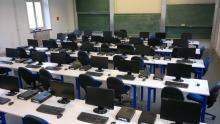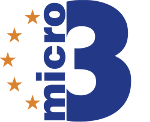- Home
- About
- OSD
- MyOSD
- Partners
- Work Packages
- WP 1Management & Coordination
- WP 2 (OSD)Ocean Sampling Day
- WP 3Oceanography & Environmental Data
- WP 4Standards and Interoperability
- WP 5Bioinformatics & Data Integration
- WP 6Exploring Ecosystems Biology
- WP 7Function and Biotechnology
- WP 8Intellectual Property (IP) Management for Marine Bioprospecting
- WP 9Dissemination & Outreach
- Public DeliverablesAll Micro B3's public deliverables
- Meetings
- Workshops
- Third Micro B3 Industry Expert Workshop
- Micro B3 Industry Expert Workshop
- Micro B3/OSD Analysis Workshop
- Micro B3 Stakeholder Workshop
- Micro B3 Summer School in Crete 2014
- Marine Metagenomics Bioinformatics
- Micro B3 Industry expert workshop
- EU-US Training 2013
- Micro B3 Statistics Training 2013
- MG4U Bioinformatics Training 2013
- Bioinformatics Training 2012
- EU-US Training 2012
EU-US Training 2012 Backgound
Rationale and Participants
 There is a pressing need to translate our considerable progress in the development and application of tools for interrogating marine sequence, environmental and “Omic’s” data into real world application through the many groups now applying these technologies to marine microbial ecology.
There is a pressing need to translate our considerable progress in the development and application of tools for interrogating marine sequence, environmental and “Omic’s” data into real world application through the many groups now applying these technologies to marine microbial ecology.
Therefore the main aims of the Marine Bioinformatic "Marine Omics" training course are:
- to bring together young scientists in a forum that will set the groundwork for future overseas collaborative interactions.
- to provide a resource for graduate students, postdoctoral researchers and faculty to acquire the skills-set necessary for proper experimental design as well as analyzing diversity, (meta)genomics, (meta)transcriptomics, (meta)proteomics, (meta)metabolomics, and associated environmental contextual data from the marine environment.
The course will involve a maximum of 24 participants, with 12 from each side of the Atlantic. Participants will be recruited from a range of backgrounds like computer science, bioinformatics, marine microbial ecology, molecular microbiology, environmental science and oceanography.
The course is a follow up of the recommendations of the EU US task force on Biotechnology Research. For more information and background please have a look at the 2010 report (PDF, 2.0 Mb).
Course Outline
 The course will cover multiple topics in Marine Bioinformatics and will be virtually split into a generic part introducing advanced bioinformatic competences and a specialized part where the developers of each of the major data analysis portals will provide an overview of their data submission, analysis and interpretation infrastructure.
The course will cover multiple topics in Marine Bioinformatics and will be virtually split into a generic part introducing advanced bioinformatic competences and a specialized part where the developers of each of the major data analysis portals will provide an overview of their data submission, analysis and interpretation infrastructure.
Each training session will be split into a theoretical part consisting of morning lectures (60-90 minutes) followed by a demonstration and hands-on part where the participants learn how to deal with the tools and interpret the results.
A poster session with flash talks (2 minutes) will be held on the first day where students will be required to briefly introduce themselves and their interests as well as a poster on their own research to promote discussion and interaction.
A distinguished scientist will give a seminar each day, covering a research area related to the topics of the course. This scientist will spend the evening and the next morning with the students to promote interaction and discussions.
The last day will be organised as an open session called “The Vision Day”. All participants are requested to sum up their visions and expectations in research with respect to the needs and obstacles that needs to be addressed by bioinformatics. It will be organised as an open forum with breakout groups to stimulate discussions and interaction. A feedback session about the content and quality of the course will help in further improving the quality of the trainings course.
For the hands-on sessions students will be placed in small work groups (2-3 people), taking care to obtain a mixture of backgrounds in each group.
Location
The course will be held in the School of Engineering and Science of the Jacobs University Bremen gGmbH. Jacobs University Bremen is a highly selective, private institution for the advancement of education and research. Its academic programs and cultural environment prepare graduates for international leadership and global citizenship. Research at the Jacobs University Bremen aims at key contributions towards the main challenges of mankind; namely: energy and materials, water and food, health, "Bildung" and communication, peace and conflict management. The School of Engineering and Science contributes mainly towards the first three of these, with focuses on two broad areas: bio-geo-marine resources and modelling of complex systems.
Find more information about Jacobs at: www.jacobs-university.de/welcome



